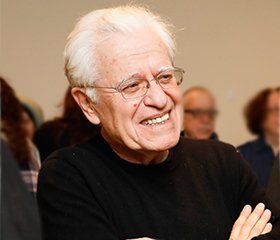The playwright John Guare and the director Jerry Zaks worked together on two of Lincoln Center Theater’s most beloved productions: House of Blues Leaves, in 1986, and Six Degrees of Separation, in 1990. Sitting down the other day to speak with Zaks, in an LCT rehearsal room, however, to discuss their latest project, Nantucket Sleigh Ride, I realized that I’d never heard the story of how the men were introduced.
“I met John before he met me,” Zaks replied. “I saw a production of one of his one-acts when I was a graduate student and I fell in love with his extraordinary sensibility and talent. Then I came to New York and acted for ten years and started directing. After a performance of Christopher Durang’s The Marriage of Bette and Boo, I met with John and Gregory Mosher.” (At the time, Mosher was the artistic director of LCT.) “They proposed that I direct House of Blue Leaves at the Newhouse.
“By coincidence, I had directed a student production the prior summer up at Dartmouth College and had fallen in love with the play. So I happily agreed to direct it again.”
I mentioned to Zaks that unlike most playwrights Guare has a unique voice. “It’s a kind of genius,” Zaks explained. “Like all the great writers, you could pull a page randomly from one of John’s scripts and make a good guess that John wrote it. He has a great ability to tell a story. I try to help him tell the story in the best way possible.”
Nantucket Sleigh Ride contains characters, some from real life, who spring forth from the imagination of the play’s main character, Mundie. I asked Zaks how he helps convey those personalities. “What they have in common is their need to communicate something as though their lives depended on it. Everyone needs to have their feet on the ground. They have to be super-real for us to understand what they’re trying to say and for us to care about them. The enemy of any play is confusing the audience. The purpose of our preview performances has been to make sure the story is clear.”
What specifically does a director do to achieve that clarity? “Everything you do in the rehearsal room is theoretical,” Zaks answered. “Once you are before an audience almost everything changes. People will tell you by their reaction or lack of a reaction whether they are following the story. You have around 10 or 12 minutes of good will from an audience once a play starts. You need to make sure in that time that the audience is with you.”
Not only the story must be made clear in previews; so must the comic beats. Zaks used the term “rehearsal laughs” to describe moments that amuse in rehearsal but don’t land with the audience. “In previews, we have to figure out why that is so. We need to get rid of what doesn’t work and hone what does.”
While playwright and director are both aiming to serve the storytelling, Zaks said that they don’t necessarily have the same method to get there. “A playwright’s approach to engaging the audience or solving a problem is often to include more; a director’s approach is usually to include less. Or at least to get rid of the writing that doesn’t efficiently further our common aim: the storytelling.”
Zaks began his career as an actor so I asked him how that feeds his directing. “It informs everything you do. I take pride in guiding actors to the best performances that they can give. I was okay as an actor but not much more than that. As an actor, I had a tendency to watch myself too much, in my mind and imagination. I don’t have to worry about that when I’m directing.”
The drama teacher Sanford Meisner once defined acting as “behaving truthfully under imaginary circumstances.” Zaks and I discussed that approach and he said, “I would amend that definition to: “acting is behavior that, as long as possible, protects the possibility of a happy ending.”
A focus on happiness – or at least its possibility – has resonance coming from Zaks. In his career he has directed both plays (such as Guare’s) and musicals – terrific Broadway revivals of Guys and Dolls, Hello, Dolly!, and, at LCT, Anything Goes – that have given joy to audiences.
Whether a scenario is happy or sad, though, Zaks is clear on the need for actors to convey their characters’ desire to communicate. “In the opening of House of Blue Leaves, he mentioned, “Bananas comes in after having watched her husband cavort with his mistress. The actor who plays Bananas must convey that everything in her wants to keep her husband at home and not leave her alone. Meanwhile, the husband needs to convey that all he wants is to get away from his wife. Once the actors convey this urgency then all kinds of comic possibilities are set up.”
What is the urgency with Nantucket Sleigh Ride? “Mundie,” said Zaks, “must convey what it was about his time in Nantucket in 1975 that left such a mark in his life. He didn’t expect to have to get to this understanding all these years later. But in the opening scene people show up at his office in New York and there you are.”
Brendan Lemon is the editor of lemonwade.com
